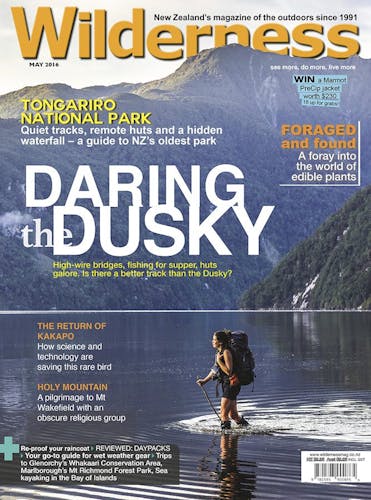Tourism is vital to New Zealand’s economy, but the industry relies on the publicly-owned conservation estate and operators should act in a socially responsible manner, writes Jamie Stewart
There has been an outcry recently over the crude slogans painted on the vehicles of rental company Wicked Campers.
Paula Bennett, the Associate Minister of Conservation, has spoken out, suggesting something should be done to get these visually-polluting vans off the road. She is the right person for the job; she is not someone you could accuse of being ‘PC’. As a leader in the tourism industry, she can help ensure it maintains a social license to operate.
Tourism, more than any other industry, makes its income off the back of public goods. Whether roads, beaches, tracks or mountain tops, tourism seeks to commoditise what belongs to us all. The trade-off the public makes is for jobs, tourism spending, vibe and the opportunity to meet great people from around the world. When sculpting its social license, tourism must admit, and seek to mitigate, its inherent problems – the carbon intensiveness of long-haul flights and the poor pay of its workers – while also keeping ahead of the negative effects of the industry on the Kiwi way of life.
Wicked Campers has appeared as a distasteful example of the way the values of New Zealanders can be trampled by tourism pressure. The Australian owners of the company make a living off New Zealand’s infrastructure and beautiful outdoors. The crude slogans painted on the back of their vans are a form of pollution whether in our cities, or within our most majestic landscapes. The misogynistic slogans are an affront to New Zealand values imposed by a faceless corporate based in another country.
While the Wicked Campers example is especially pernicious, it is only the tip of the iceberg. How best to manage freedom camping is one of the most challenging issues in regional New Zealand. Put simply, in many areas these travellers are taking more than they are giving. There is also a risk of attitudes hardening against people who freedom camp, which will displace the Kiwis who enjoy doing this too, whether at a road-end or a nice spot beside a lake.
Meanwhile, in the backcountry, concern remains about the hijacking of Department of Conservation funds to provide for tourism. As DOC is required to spend more money on the maintenance of tourism infrastructure, less is available for providing a spectrum of recreation opportunities for Kiwis.
DOC is also under extreme pressure to accommodate the tourism industry, even if this requires paying lip service to national park conservation plans which are carefully negotiated with the community. The latest example is the proposal to increase scenic helicopter landings on the Ngapunatoru Ice Plateau in Fiordland National Park from the current daily legal limit of 10 to 80 – a 700 per cent increase.
This decision, based on a ‘research’ justification not dissimilar to how the Japanese justify whaling in the Southern Ocean, threatens to industrialise the Darran Mountains, home to New Zealand’s most cherished alpine rock climbing and the Kaipo Wall, New Zealand’s biggest cliff, and threatens the neighbouring Pembroke Wilderness Area with a constant drone of helicopters.
Those who have fought for Wilderness Areas – places for recreationalists to experience nature free from the evidence of human impact – for over 35 years are faced with seeing hard-fought gains slip from their grasp in a matter of months as the tourism industry cracks its knuckles. It is galling that this priority is given to an aviation industry that sees no problem with swooping with impunity on the Kepler Track or indeed the Olivine Wilderness Area. An FMC Youth Scholarship recipient recently walked for three days to the Olivine, the remotest of ice plateaus, and was confronted with a swarm of helicopters flouting regulations when she got there.
Helicopters have their place in the backcountry, but like campervan companies they have to be respectful corporate citizens.
The mutual respect between Kiwis and tourism operators will not last if examples such as these continue to proliferate and if DOC’s budget continues to be bled dry by increasing tourism pressure without any commensurate increase in funding.
There is a limit to what an industry that struggles to pay its people well can be expected to contribute to conservation, but at least the increased GST harnessed from tourists should be allocated back to the areas where the impact of visitors is taking a high toll on both people and environment.
Once Paula Bennett has dealt to Wicked Campers, this should be her next challenge.
– Jamie Stewart works for Federated Mountain Clubs of New Zealand







